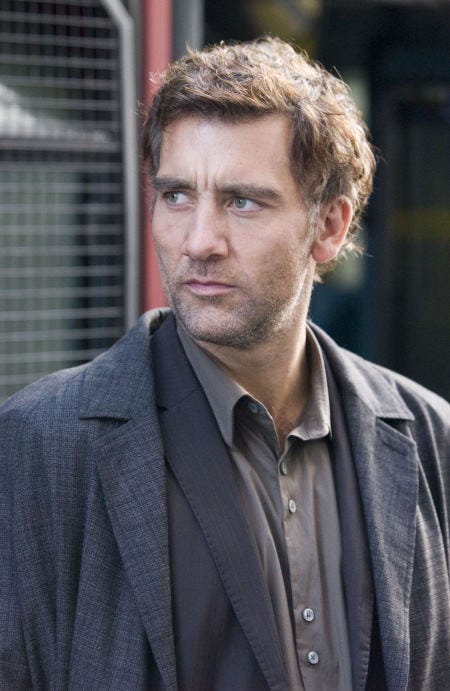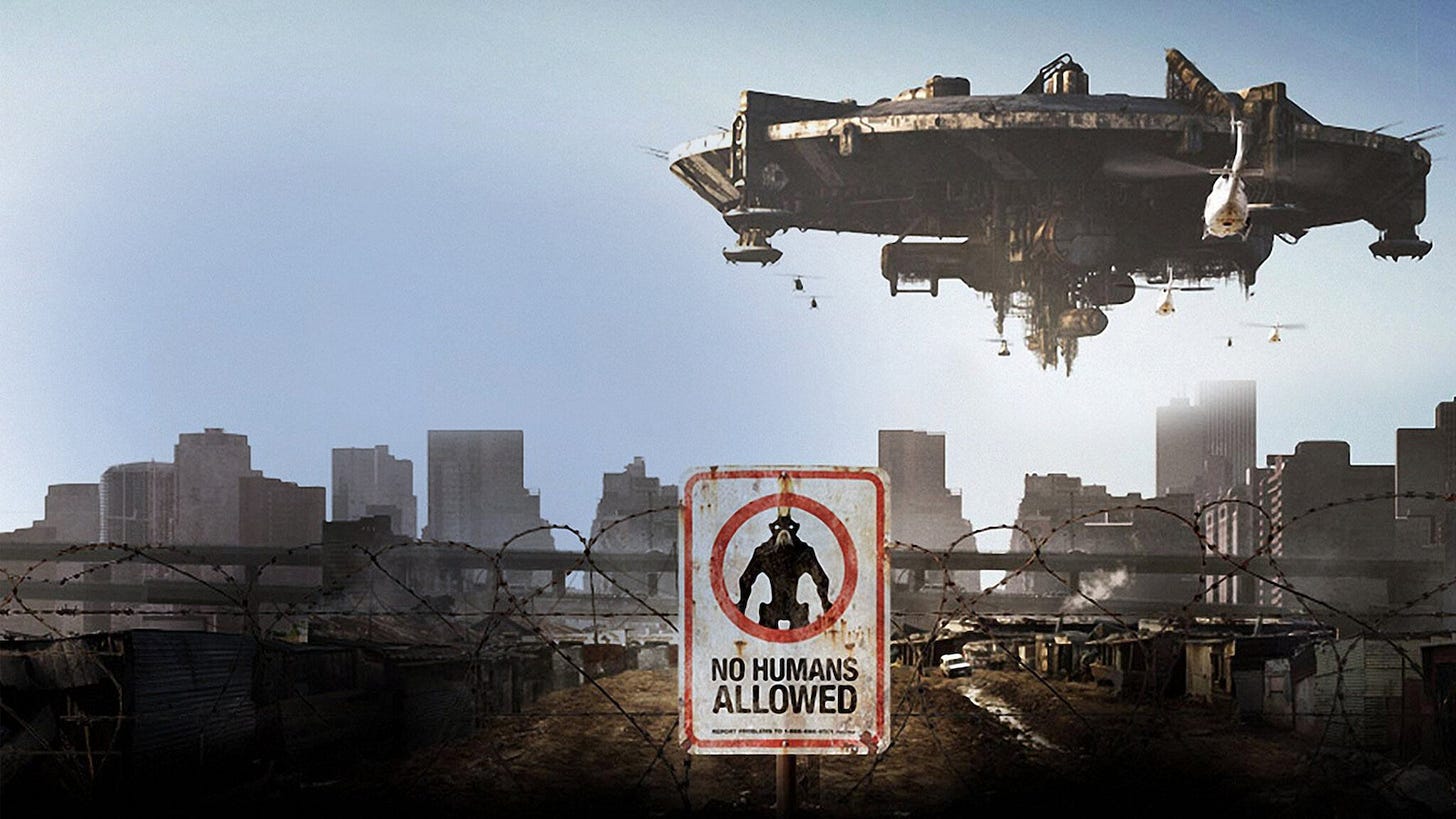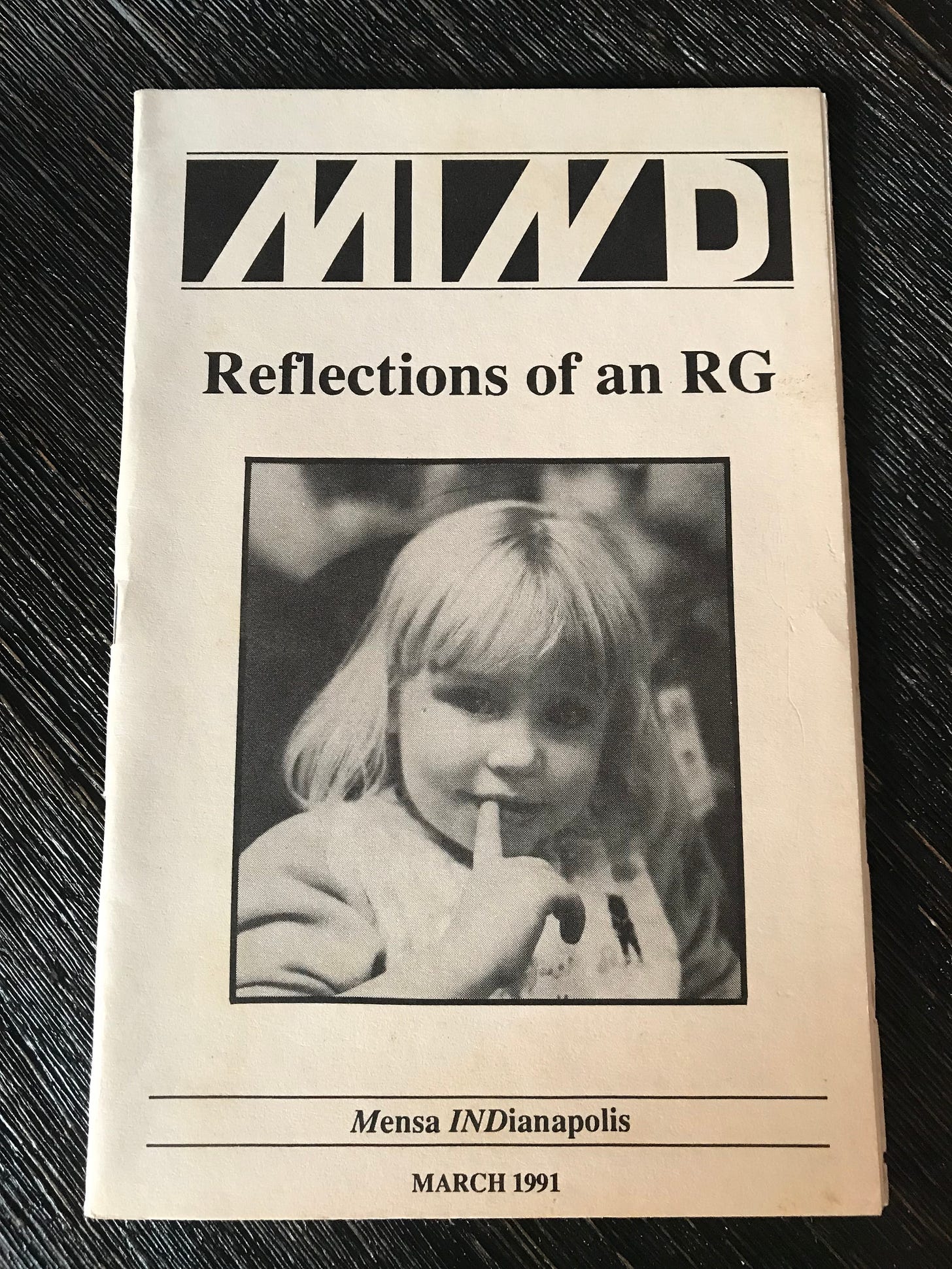I have never listened to anyone who criticized my taste in space travel, sideshows or gorillas. When this occurs, I pack up my dinosaurs and leave the room.
― Ray Bradbury, Zen in the Art of Writing
My story unfolded through TV, movies, and a few scattered books. So, that is the way I will tell it to you. Fellow children of the ‘90s, surely you understand. What other paths did we have?
For me, like so many others, there were signs at the very beginning. I’ve always preferred certain things. Been a certain way. When I was very young, I was obsessed with the movie Terminator 2. I had my dad shave my head so I could look like Ripley from Aliens. (I kid you not; my parents just rolled with it—I am extremely lucky in that regard.) I loved Predator, Total Recall, Heavy Metal and The Thing, movies no other girls my age even knew about, let alone watched over and over on VHS while my dad was off doing God knows what.
I got older. For the most part, I fit in. I genuinely enjoyed the light-hearted, heteronormative programming that absorbed our collective consciousness through the Y2K era— The Bachelor (which I watched live when it aired in 2002), Friends, Sex and the City. I slogged through the reading lists assigned to me, and I tried to care about Holden Caulfield like the rest of my classmates in Advanced English. I tried. But something was missing from his seminal, meandering angst. Maybe it was too real; maybe it wasn’t real enough. It’s impossible to say after all this time. Eventually (mercifully) came Fahrenheit 451, Lord of the Flies, Shirley Jackson’s short story The Lottery. I felt something familiar unwrapping itself as I read. I couldn’t name it, but I knew it—a primitive tingle that had always been there, flying under the radar of childhood naiveté, and which would become so familiar to me in the years beyond. I feel it now, in this very room, looking at my shelved copy of Brave New World.
It wasn’t until sophomore year in college that I was dragged, by accident, into the next, more potent chapter of my story. College is the time for these things. We were all trying on different clothes, different tastes, different masks. It was one big experiment that, with any luck, brought us closer to our truest selves. At the behest of an ex-girlfriend, I dabbled briefly in Buffy the Vampire Slayer. Not really my thing. Again, too real. Again, not real enough. I took a class on UFOs through the “experimental college program” run by other students and, in this particular case, random members of the community. (Thank you, private liberal arts school.) I did my final project on the Mothman. It felt good…closer to good, anyway. I thought, for a short time, that aliens and rural legends would quiet my nascent appetite. I thought I was satisfied. And then, in the winter of 2007, I saw Children of Men in the theater.
My god, my god. A whole world. The despair, the urban collapse. A perfect premise—the end of humanity not by war, not by zombies, but by the slow death of our species due to worldwide infertility. (Not to mention Clive Owen, who has been saving me from dystopian ghettos in my daydreams ever since.) As we left the theater, I asked my friends what they thought. “It was good,” they said. “Clive Owen is hot,” and off they moved to the next topic. No one wanted to discuss the ethical considerations of government-issued suicide pills. Not a single friend stopped to reflect on the sociopolitical symbolism of the first baby in nearly two decades of human history—a literal savior—born unto a destitute refugee of color.
A line from the movie rang in my head as we walked out of the theater into the filtered daylight of South Park Mall. Theo, the grisled protagonist, says to Nigel, a London art dealer hoarding masterworks during humanity’s last gasp, “You kill me. A hundred years from now, there won't be one sad fuck to look at any of this. What keeps you going?”
“You know what it is, Theo?” Nigel replies. “I just don't think about it.”
Finally, something so close—but just far enough—that it felt true.
Two years later, District 9 was released. No one would see it with me, so I sat in the scratchy red theater seat alone, marveling at the scale of the alien spaceship, thrilled by the news reports of chaos and the artful found footage. Later that fall, a friend from UFO class and I made a pilgrimage from Oberlin to the Sheffield Regal Cinemas to see The Fourth Kind. We were both excited by the trailer and made a point to go. I don’t think it was ever supposed to be a date, but to this day, I still wonder if he thought it was. I know my intentions were pure; I just wanted to see an alien invasion in far-off Alaska (a favorite setting of mine) and, finally, there was someone who wanted to see it, too. The movie was disappointing, but the company wasn’t. He and I still occasionally share alien-related content with each other on Instagram from the comfort of our respective marriages. Perhaps, in retrospect, he was one of the first people to ever see me for what I am.
A decade later, a slew of contagion-premised content streamed its way into my home just as a real-life contagion was slowly circling the globe. For some reason, just like most semi-apocalyptic premises, I found it all very comforting. I enjoy exploring worst-case scenarios, even in real life. I have a well, how low can we possibly go here? attitude that keeps me level and pragmatic. Contagion, Station Eleven (which was the best thing I watched on television in 2021 and a show I loved so much I might have read the original source material—a 2014 novel by Emily St. John Mandel—had I had the emotional fortitude to consume yet more content about the end times), followed by a rewatching of World War Z and 28 Days Later.
“Why are you watching this?” My husband, Austin, asked me time and time again as he peeked in from the kitchen. He didn’t like any of it. Why didn’t he like it? I thought. Why didn’t everyone like it? It’s disease! Sometimes Zombies! It’s the end of the world, cures, rebirth, class wars, hand-to-hand combat, new societies, technological challenges and solutions! What could be better? What else could be more entertaining, more thought-provoking?
What else could dance so smartly just far enough beyond the realm of possibility?
You see? There were always signs. But you must understand that my whole life, I haven’t had the vocabulary for it. I didn’t grow up with role models or community. It wasn’t even something I considered, and how could I? I have always passed as “normal”; no one would have guessed. No one, not even those closest to me, brought it up.
It wasn’t until very recently—within the last 6 months—that some of these lifelong proclivities became louder and more urgent. Maybe it’s that I’m getting older and more comfortable. Maybe, subconsciously, I’ve gotten too tired to hide. It began with the Last of Us Season 1. I watched it when it debuted, and it was commercial enough for Austin to join in. But then I watched it again in secret. And one more time by myself, a year later, to prepare for the release of Season 2. And since I was rewatching The Last of Us, I went ahead and rewatched Station Eleven, for good measure, sitting alone on my bed with my iPad and airpods, so that no one downstairs could hear my compulsive behavior. Then it was Fallout, then Paradise, which I also watched alone. And then, then it was Silo.
“Austin, this is so good!” I told him when I discovered it (after reading the entirety of the Paradise subreddit, including thread upon thread of fan theories, which really should have been a lightbulb moment in and of itself, and yet). “Do you want to watch it with me?”
“Uhh, no.”
“Why not? I think you’d really like it!”
“Stafford, when have I ever liked those kinds of shows? Those are your shows.”
My shows. My shows. A faint bell dinged inside me. The whisper of known identity, a black light over invisible ink. The funny feeling of seeing, for the first time, what had been there all along.
When the second season of Silo ended and I learned I would have to wait a full year until Season 3, I went to the subreddits. I scoured the pages. My behavior escalated. I participated in fan discussions. One might say I came out in the safety of the online community before I came out even to myself, but really I knew. I knew.
The point of no return arrived one morning in early April. The whole house was scrambling to get ready for school and work and I sat at my vanity, staring down at my phone.
“Austin, I have to tell you something,” I said to him while he did his hair in the bathroom mirror.
“Okay?” He came in and sat down on the bed, sensing that this was something important.
“I just spent $19.99 on the audiobook Shift, which is the second book in the Silo trilogy. I looked for it on Libby, but it would be like an eight-week wait, and it’s not included with Spotify premium. I just can’t wait another year for the story, and I heard the books are really good.”
“Okaaay…” he replied slowly.
“What I’m trying to say is.”
I took a breath. Here it was.
“I’m a science fiction fan. Like, for real.”
The truth fell out into the room. Now it belonged to both of us.
“Please don’t make fun of me, I’m serious.”
Austin smiled kindly and gave me a pat on the shoulder. “Okay, ya fucken nerd.”
Here’s what I’ve learned in the weeks since coming out: science fiction is a broad genre. It isn’t just Star Trek and Battlestar Galactica, like I grew up thinking. After literally (tragically) reading the Wikipedia article for “science fiction” because I was so ignorant, despite liking the stuff my whole life, I was comforted by the following passage:
"Even the devoted aficionado or fan—has a hard time trying to explain what science fiction is," and the lack of a "full satisfactory definition" is because "there are no easily delineated limits to science fiction." — Lester Del Ray, American science fiction author.
Before now, I thought the fandom (God, even the phrase fandom feels like a nerd bridge too far) was a monolith. I grew up in Mensa—a story for another time, but believe me, Mensa is crawling with hardcore sci-fi fans, none of whom I related to in any way. The gaggle of grey-haired, snaggle-toothed IBM retirees my parents spent time with in the 1990s was my only human reference point for the fandom, really, besides the people I more recently imagined going to sci-fi conventions dressed as Princess Leia or some character from Cowboy Bebop. (I shudder at the thought.) But the genre is vast and varied; there are many flavors of fiction and many flavors of fans.
Realizing that I can pick and choose sci-fi subgenres was a big step in feeling more comfortable with my identity. I know what I like: dystopian fiction, climate fiction, apocalyptic and post-apocalyptic scenarios, societal collapse, contagion theories, nuclear winter, and zombie/alien invasion (Prestige, not pulp. They must be high-budget zombies and aliens. If the high-budget zombies and aliens have a ground zero in remote Alaska, that is ideal). I know what I don’t like: space opera, cyberpunk, utopian fiction, superhero fiction, sword and sorcery, and slipstream (where the fantasy genre “slips” into the sci-fi story—I can truly think of nothing worse, but it’s a thing).
It took me so long to identify myself as a science fiction fan because I kept telling myself that the things I enjoyed “weren’t science fiction”. Zombies? No, those are just Zombies. Station Eleven? You know, where a plague wipes out most of humanity and the survivors are left to navigate the American Midwest? Why, that’s just good storytelling! It turns out, almost every movie and show I’ve ever rewatched to death is, indeed, science fiction. But it wasn’t until I journeyed into purchasing a modern, unadulterated science fiction novel as an adult (it’s part of a saga, for crying out loud) that I dared to call it by its name.
My immediate family knows, a few of my friends and colleagues know, and now, dear readers, so do you. In college, the party line was that “labels are for jars”, but I’ve always found small comfort in them. I am a millennial. I am a mother. I am a creative, an artist, a teacher, a wife, a writer, a doll person, a fairly basic bitch, and a science fiction fan. So, where do I go from here? Am I looking for sci fi friends? Is this a networking post? It’s hard to say. All I really know, at this very moment, is that it means enough for me to need to say it out loud.
I mentioned my recent revelation to some of my most trustworthy students, and within minutes they were bombarding me with manga suggestions, which is not at all what I had hoped for. Not only do I think manga is weird (sorry, Mom, it’s cool that you like it because you’re 66, but I personally cannot get down), I have to first finish Shift and the 1994 made-for-TV miniseries, Stephen King’s The Stand. (Contagion premise + battle between good and evil. Allegedly better than the 2020 remake. Eee!) But, if you know of any well-written climate fiction, by all means, send it my way. Or—just for instance—if you, too, recently wandered onto Imgur looking for extremely-hard-to-find artwork from Station Eleven’s in-world graphic novel, maybe we should talk.









You mean I can be a fan of sci-fi without having a fursona?
I always thought since I was repulsed by the idea of sleeping with a fuzzy wolf, I couldn’t possibly be sci. But here we are.
I’m now puzzled as to how you could see right through my soul like this and then not mention the modern mother lode—Black Mirror! If it’s not your favorite show, surely that means you haven’t seen it. I just won’t accept any other answer.
Now I know why we are friends